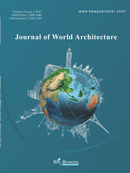Abstract
This paper is based on the phenomenon of Tittytainment and big data control. It discusses the ways in which working youths live and work in their large suburban communities in Beijing as well as their leisure and entertainment activities. Then develops a problem statement and research questions. In addition, the project explores this reality phenomenon dialectically through the analysis and speculation of the new virtual reality technology “Metaverse.” Based on a critical design approach, the phenomenon is explored through a detailed description and examination of reality, before critically suggesting the possibility of future social control by big data companies through the “metaverse” space. Furthermore, this paper alerts to the neoliberalism that dominates globalization through anti-utopian expressions, waking up young people who are compromised by big data control and addicted to Tittytainment.
References
Miraftab F, Wilson D, Salo K, 2015, Cities and Inequalities in a Global and Neoliberal World. Routledge.
Brenner N, Theodore N, 2005, Neoliberalism and the Urban Condition. City, 9(1): 101-107.
Brian K, 2015, OECD Insights Income Inequality the Gap between Rich and Poor: The Gap between Rich and Poor. OECD Publishing.
Berry M, 2014, Neoliberalism and the City: or the Failure of Market Fundamentalism. Housing, Theory and Society, 31(1): 1-18.
World Bank, 1992, World development report 1992: Development and the environment. The World Bank.
Martin P, Schumann H, 1997, Die Globalisierungsfalle, Der Angriff auf Demokratie und Wohlstand. Ich. Die Psychozeitung, Berlin (UVA), 8(2): 8-11.
Postman N, 2011, Technopoly: The Surrender of Culture to Technology. Vintage.
Arsenault AH, 2017, The Datafication of Media: Big Data and the Media Industries. International Journal of Media & Cultural Politics, 13(1-2), 7-24.
Hallur GG, Prabhu S, Aslekar A, 2021, Entertainment in Era of AI, Big Data & IoT. In Digital Entertainment. Palgrave Macmillan, Singapore, 87-109.
Zwitter A, 2014, Big Data Ethics. Big Data & Society, 1(2): 2053951714559253.
Zheng S, Long F, Fan CC, et al., 2009, Urban Cillages in China: A 2008 Survey of Migrant Settlements in Beijing. Eurasian Geography and Economics, 50(4): 425-446.
Herschel R, Miori VM, 2017. Ethics & big data. Technology in Society, 49: 31-36.
Dionisio JDN III, Gilbert R, 2013, 3D Virtual Worlds and the Metaverse: Current Status and Future Possibilities. ACM Computing Surveys (CSUR), 45(3): 1-38.
Ludlow P, Wallace M, 2007, The Second Life Herald: The Virtual Tabloid that Witnessed the Dawn of the Metaverse. MIT Press.
Jurkiewicz CL, 2018, Big Data, Big Concerns: Ethics in the Digital Age, Public Integrity, 20(sup1), S46-S59.
Smart JM, Cascio J, Paffendorf J, 2007, Metaverse Roadmap Overview, Accelerated Studies Foundation. Retrieved 2010-09-23.
